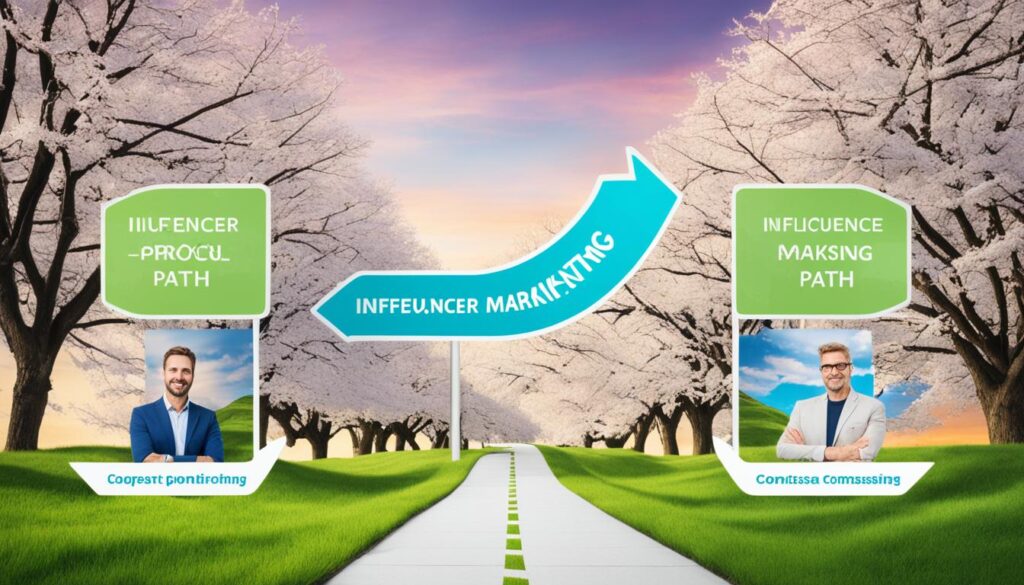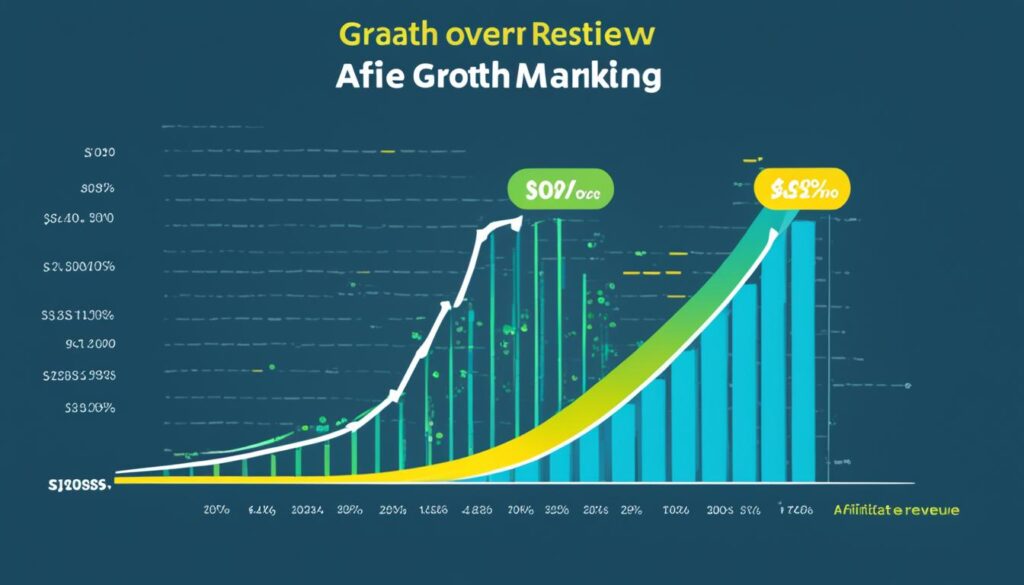Affiliate marketing is a way to make money by promoting products from other companies. If you want to add more income sources or begin an online business, it’s key to learn about affiliate marketing. It’s exciting and profitable.
In affiliate marketing, there are three main roles: the seller, the affiliate, and the buyer. The seller has a product, the affiliate advertises it, and the buyer buys it via the affiliate’s link. The affiliate then gets paid a commission for every sale made.
The popularity of affiliate marketing has soared, especially in the U.S. From 2017 to 2022, the spending is expected to rise from $5.4 billion to $8.2 billion. This increase shows the huge potential of affiliate marketing. Now, let’s explore how it operates, its various forms, and starting steps.

Key Takeaways:
- Affiliate marketing involves earning commissions for promoting and selling products from other companies.
- It consists of three parties: the seller, the affiliate, and the consumer.
- Affiliate marketing spending in the United States is projected to reach $8.2 billion in 2022.
How Does Affiliate Marketing Work?
Affiliate marketing is a strategy that spreads out the work of marketing. It involves the seller, the affiliate, and the consumer. They work together to profit from each other.
The seller: This could be a person or a business with a product to sell. They make the product and want more sales and money.
The affiliate: This is the marketer who advertises the seller’s items. They use websites, blogs, social media, or emails to grab attention. Their goal is to bring potential buyers to the seller.
The consumer: They are the buyers who find products through the affiliate. They make purchases via the affiliate’s link.
When a purchase is made through the affiliate’s link, they get paid a commission. This payment rewards the affiliate for their successful marketing efforts.
Affiliate marketing benefits everyone involved. Sellers get their products marketed at less cost. Affiliates earn by promoting what they like. Consumers find new products thanks to the affiliates’ recommendations.
| Party involved | Responsibilities |
|---|---|
| Seller/Product creator | Creates and produces the product/service Provides promotional materials Handles customer support and order fulfillment Pays commissions to affiliates |
| Affiliate/Marketer | Promotes the seller’s products/services Drives traffic to the seller’s website/product page Uses various marketing channels and strategies Earns commissions for successful sales |
| Consumer | Discovers products/services through the affiliate’s promotion Makes a purchase through the affiliate’s referral link Benefits from personalized recommendations and insights |
Types of Affiliate Marketing
There are different ways you can get into affiliate marketing to make money and earn commissions. We’ll look into the three main types: unattached, related, and involved affiliate marketing.
Unattached Affiliate Marketing
Unattached affiliate marketing means promoting products without knowing them personally. The affiliates use smart marketing to sell, not their own experiences. They do lots of market research and analysis to find the right customers and make sales.
Related Affiliate Marketing
This type is for those who know the niche but haven’t used the product themselves. They use their reputation or followers to promote products. An example is a fitness influencer who endorses fitness gear to their followers without having tried all of it.
Involved Affiliate Marketing
Involved affiliate marketing is for those who personally use and trust what they promote. They share their own stories and benefits of the product. This often involves creating reviews or tutorials to show how good the product is.
Choosing the right affiliate marketing type depends on what you know, your niche, and what you like. Each type has its benefits and things to think about. Think about what you’re good at and who you want to reach before picking the type that fits your goals.
| Type of Affiliate Marketing | Advantages | Considerations |
|---|---|---|
| Unattached Affiliate Marketing | – No personal experience required – Opportunity to tap into various niches – Can reach a broader audience |
– May lack personal authenticity – Requires extensive market research – Need for effective targeting and marketing strategies |
| Related Affiliate Marketing | – Leverage existing authority/influence – Can connect with target audience effectively – Opportunity for collaborations and partnerships |
– Need to build credibility and trust – Should select relevant products and brands – Limited to related niches |
| Involved Affiliate Marketing | – Personal experience and authenticity – Opportunity for in-depth product reviews – Higher potential for conversions and customer trust |
– Limited to products you have tried – Need to invest time in testing products – Must provide valuable and informative content |
Successful affiliate marketing often combines different types. This lets affiliates reach more people and use various ways to promote. It’s key to pick a method that uses what you’re best at and loves doing. This way, you can gain trust, add value, and effectively make sales.

How Do Affiliate Marketers Get Paid?
Affiliate marketers get paid in different ways for promoting products and making sales. Let’s look at the common payment methods in affiliate marketing:
1. Pay Per Sale (PPS)
In Pay Per Sale, affiliate marketers make money as a percentage of sales. When a buyer purchases a product using their affiliate link, they earn. This commission is linked to the customer’s total spend, directly connecting effort to earnings.
2. Pay Per Lead (PPL)
Pay Per Lead means marketers get paid for lead generation. Actions like filling a form, signing up for a newsletter, or completing a survey count. They earn a commission for every lead, buy or not.
3. Pay Per Click (PPC)
Pay Per Click rewards marketers for sending traffic to the merchant’s site. They earn every time someone clicks their affiliate link and visits the site. Buying isn’t necessary here, but traffic is crucial.
4. Pay Per Install (PPI)
Pay Per Install pays marketers for every app or product install. Each installation through their link earns them money. This is common for software and mobile apps.
Each method offers different benefits for marketers. Picking the right model depends on goals, audience, and strategy.
| Payment Model | Description |
|---|---|
| Pay Per Sale (PPS) | Earn a commission based on the sale price of a product |
| Pay Per Lead (PPL) | Receive a commission for each qualified lead generated |
| Pay Per Click (PPC) | Earn a commission for each consumer click on the affiliate link |
| Pay Per Install (PPI) | Receive a commission for each successful product installation |

Choosing the right payment model is key in affiliate marketing. It impacts earnings greatly. It’s wise to research and select good affiliate programs that offer fair commissions.
How to Start Affiliate Marketing
Want to make money while you sleep? Consider affiliate marketing. It’s where you promote others’ products and get paid. Here’s how to start:
- Choose a Niche or Topic: Pick something you love or know lots about. It’ll be easier to share and connect with others.
- Decide on a Platform: Choose where to share your affiliate links. Websites, blogs, or social media can all be good choices.
- Find Relevant Affiliate Programs: Search online or through affiliate networks for good programs. Go for those with a strong reputation and fair commissions.
- Create Valuable Content: Make content that helps solve problems or offers new information. Good content attracts and engages, bringing potential customers.
- Build an Audience: Use SEO, social media, or other strategies to draw people to your content. Build trust and a loyal following.
- Ensure Compliance with FTC Regulations: Be honest about your affiliate links. It keeps things clear and follows the law.
Starting is just the beginning. To do well, you need steady effort, commitment, and a willingness to learn more. Follow these steps to lay a strong base for your business. Then, keep working at it!

Benefits of Affiliate Marketing
Affiliate marketing has many benefits that attract people to the online business space. It’s great for both beginners and seasoned marketers. Here are the main perks of affiliate marketing:
1. Low Startup Costs and Risks: Starting an affiliate business is cheaper than traditional ones. You don’t need to make your own products or keep stock. This means less money and less complexity.
2. Promote Products from Various Companies: You can promote many different products as an affiliate. This lets you offer varied items to different people. It helps increase how much you can earn.
3. Potential for Passive Income: Affiliate marketing can earn you money even when you’re not working. After setting up and creating good content, you can make money from sales through your links.
4. Scalability and Growth: You can grow your affiliate business a lot. As you get more experience, you can work with more companies. You can also try new marketing ways to earn more.
5. Work in a Niche You’re Passionate About: You can choose a niche you love in affiliate marketing. This makes work fun and lets you use your expertise to help your audience.
6. Monetize Your Expertise: If you’re good at something, you can earn from it with affiliate marketing. By suggesting good products and sharing insights, you become a trusted guide. This way, you can make money through your recommendations.
7. Build Relationships with Brands: Affiliate marketing lets you work closely with brands. These partnerships can lead to new chances like sponsored content. They can also offer special deals to your followers and give you better marketing tools.
8. Earn Commissions for Driving Sales: The main goal of affiliate marketing is to earn commissions from sales. With the right marketing tactics, you can boost your income and succeed financially.

Affiliate marketing offers a path to a fulfilling career. It lets you work independently, earn passive income, and have a real impact in your chosen field.
Affiliate Marketing Tips
Want to win at affiliate marketing? Here are top tactics to boost your efforts and reach your dreams:
- Choose quality products or services: Prioritize quality when picking affiliate products to promote. Go for reputable brands known for their excellence. High-quality products help gain your audience’s trust, boosting your chance of success.
- Create high-quality content: Content rules in affiliate marketing. Make content that’s valuable and grabs your audience’s attention. Share tips, solve issues, or tell your stories. This keeps your audience interested, encouraging them to click your affiliate links.
- Build trust through authenticity and transparency: Being clear and genuine builds trust with your audience. Honestly reveal your affiliate relationships. Authenticity and transparency pave the way for credibility and lasting audience relationships.
- Diversify your income streams: Don’t just stick to one product or company. Promote various products from different companies. This method reduces risk and appeals to more people, addressing diverse needs and tastes.
- Track and analyze your performance: Keep an eye on your results to see what’s effective. Watch your click-through and conversion rates. Use this data to fine-tune your strategies, focusing on what brings the best outcomes.
- Stay updated on industry trends and best practices: Affiliate marketing is always changing. Keep up with the latest trends and methods. Attend conferences, join forums, and follow experts to boost your affiliate marketing skills.
Applying these tactics to your affiliate marketing plan can greatly improve your success chances. It requires hard work, patience, and a constant desire to learn and adjust to reach your targets.

Affiliate Marketing Strategies
Employing strategic approaches in affiliate marketing is key to success. Here are strategies to help you achieve your goals:
Niche Marketing
Focus on niche marketing by targeting a specific audience. Position yourself as an authority in that area. This will help establish a strong presence and attract a dedicated audience.
Content Marketing
Create valuable and informative content to engage your audience. Deliver high-quality content tailored to your target market’s interests and needs. This builds trust and promotes your affiliate products.
Email Marketing
Email marketing promotes affiliate products and builds audience relationships. Use email campaigns to deliver targeted messages. This promotes products, offers discounts, and nurtures customer relationships.
Influencer Collaborations
Influencer collaborations are popular in affiliate marketing. Partner with influencers who have a large following. Leverage their trust and reach to promote your products.
Social Media Marketing
Social media marketing reaches and engages your audience. Platforms like Instagram, YouTube, and TikTok are great for showing off products. Use social media to drive traffic and increase sales.

Effective strategies vary, so know your audience and market trends. By combining these strategies and staying proactive, you’ll enhance your efforts and succeed in the long term.
Affiliate Marketing Examples
Want inspiration for affiliate marketing across different fields and niches? Here are examples of affiliate marketing done right:
1. Product Review Websites
Product review sites like CNET or Wirecutter show affiliate marketing well. They review a range of products, from tech to home goods. They earn money when people buy products using their links.
2. Lifestyle Bloggers
Lifestyle bloggers make money by promoting fashion and beauty items. They share style tips and reviews. When readers buy through their links, they get a commission. Successful bloggers include Chiara Ferragni of The Blonde Salad and Emily Schuman of Cupcakes and Cashmere.
3. Social Media Influencers
Social media stars use their followers to sell products. Fitness and wellness influencers share workout and health items. They earn commissions from sales made through their affiliate links.
4. Content Creators
Content creators pair with brands for sponsored content that includes affiliate marketing. For example, a travel YouTuber might showcase luggage and offer an affiliate link for purchases. This results in commission for each sale.
Affiliate marketing is versatile and profitable. It’s a good choice for review websites, lifestyle influencers, or content creators. It offers many ways to make money by promoting products.
See the table below for a summary of the affiliate marketing examples:
| Example | Industry/Niche | Platform | Revenue Model |
|---|---|---|---|
| Product Review Websites | Various | Websites | Commission per sale |
| Lifestyle Bloggers | Fashion, Beauty | Blogs, Social Media | Commission per sale |
| Social Media Influencers | Fitness, Wellness | Social Media | Commission per sale |
| Content Creators | Various | YouTube, Podcasts | Commission per sale |

Affiliate Marketing vs. Influencer Marketing
Affiliate marketing and influencer marketing help promote products or services. However, they differ.
Affiliate marketing aims at driving sales and earning commissions with affiliate links. On the other hand, influencer marketing focuses on showing off the brand. It involves working with influencers to get the message across to specific people.
Affiliate marketing:
It’s based on performance.
You get paid for sales made.
Uses affiliate links to promote items.Influencer marketing:
It’s all about showing off the brand.
Works with influencers.
Aims to reach certain people.
Using both strategies can be very powerful. Some marketers mix them up for better results.

Affiliate Marketing vs. Influencer Marketing
| Affiliate Marketing | Influencer Marketing |
|---|---|
| Focuses on driving sales | Emphasizes brand exposure |
| Earns commissions through affiliate links | Collaborates with influencers |
| Compensation tied to sales | May involve upfront payments or brand partnerships |
| Performance-based | Targets a specific audience |
Affiliate Marketing Statistics
Affiliate marketing is growing fast and has a big future ahead. Ecommerce sales could reach $68 trillion by 2027 worldwide. In the U.S., money spent on affiliate marketing went from $5.4 billion in 2017 to $8.2 billion in 2022. These numbers show how popular and trusted affiliate marketing has become as a strategy for businesses.
But remember, not everyone makes a lot of money in affiliate marketing. Most earn less than $10,000 a year. It takes hard work, persistence, and the right strategies to be successful.
Looking at the data can help understand affiliate marketing’s potential. Here are some important statistics:
* Over 80% of brands use affiliate programs.
* Affiliate marketing accounts for 16% of e-commerce orders in the U.S. and Canada.
* 38% of marketers see affiliate marketing as a key way to get new customers.
* On average, 15-30% of sales for advertisers come from affiliate programs.
* Around 72% of publishers find and promote products through affiliate networks.
These facts show that many businesses use affiliate marketing to grow. It helps companies increase sales, get more known, and reach new customers.
To do well in affiliate marketing, staying up to date with trends and consumer habits is important. Adapting to changes helps marketers succeed in the long run.
Here’s a table that shows how affiliate marketing has changed over the years:
| Year | Global Affiliate Marketing Revenue (in billions) |
|---|---|
| 2017 | $5.4 |
| 2018 | $6.8 |
| 2019 | $7.8 |
| 2020 | $8.5 |
| 2021 | $9.1 |
| 2022 | $8.2 |
Note: This table uses estimates to show trends in affiliate marketing.

The table shows the ups and downs in affiliate marketing revenue over time. Adapting to market changes is crucial for success.
The data makes it clear: affiliate marketing has a lot of growth potential. By using affiliate partnerships, marketers can reach more customers, make their brands more visible, and earn more money.
Conclusion
Affiliate marketing is a great way to make money online. It lets people earn by promoting brands and products. Affiliates use their know-how, audience, and marketing skills to get commissions on sales. This creates a benefit for both the affiliates and brands. Affiliates get to make passive money, and brands get more sales and visibility.
To start in affiliate marketing, you need to know what it is and how it works. You will promote products in different channels and get paid for every sale. This lets you earn from your hobbies or expertise. You offer great products to buyers and get a part of the profits.
Success in affiliate marketing means using the right tactics. You have to pick good products, create helpful content, and win your audience’s trust. You also need to keep up with market trends. Following rules and being clear about your affiliate links keeps trust. With hard work and smart strategies, affiliate marketing can be a rewarding venture for newbies and pros.